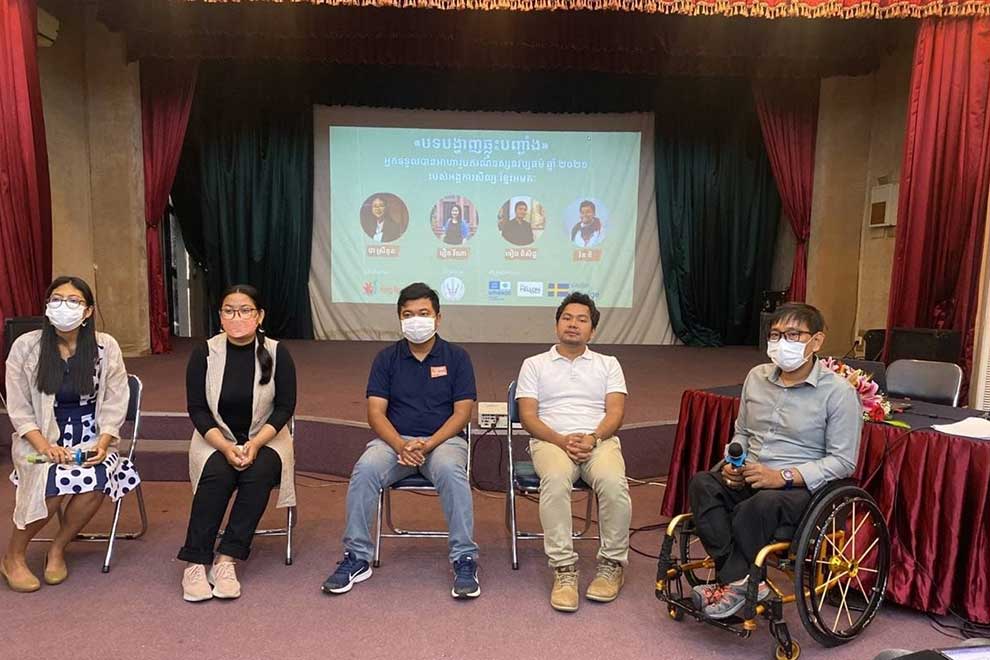
Cambodian Living Arts (CLA) open their second annual creative writing contest. SUPPLIED
Although diversity and integration are widely celebrated in today’s world, discrimination still exists. Writers, artists and thinkers intend to explore this through writing, in a just-announced competition.
Cambodian Living Arts (CLA) declared that entries are open for their second annual creative writing contest. The top four entrants will earn cash prizes during the upcoming 2023 Cultural Season, to be held under the theme “Your Kind, Our Kind”.
Po Sakun, network knowledge and policy program coordinator at CLA, revealed the purpose of the format: “We want to encourage writers to embrace their creative style and imaginations.”
“We want to contribute to the promotion of Khmer literature and writing. The works can be novellas, short stories, and poems – either traditional or modern, with illustrations. The competition is open to anyone who enjoys free writing and wants to engage on a broader topic,” he added.
The deadline for applications for the competition is September 30. You can submit your application to the CLA office on Sothearos Blvd, Phnom Penh, or email them to [email protected].
Applicants must complete an application form and provide background on their experience, included any published or translated works.
The winning four writers will receive a cash prize of $500 and the opportunity to increase their audience and take part in cultural tours in the provinces.
Applications can be made in Khmer or English for K-Visa holders. If the entered work is in English or another foreign language, the candidate will be required to translate the text into Khmer. Winners and shortlisted candidates will be notified in the second week of October.
Lay Chhunyi, one of the top four in last year’s competition, said “As an imaginative person, I am not always comfortable expressing myself because I’m not sure people will understand my thoughts. CLA changed my mind completely after winning the creative writing competition. I am really happy to finally have my imagination read to you all.”
“Creative writing gives me the freedom to create my own story. I can use my imagination to make something new, unique and entertaining, while the story retains its educational value. This was one literary competition where I felt like I wrote my own story rather than trying to please the judges,” said another finalist, Chea Tonghay,
“Creative writing allows writers to think outside the box without worrying about the rules of composition, while maintaining the meaning, image and essence of the story,” added Kanya Pop Ane, another top-four entrant from the 2022 contest.
“Of course, we need to preserve the literature of our ancestors, but that does not mean that we should not develop it. This is what creative writing is doing. By giving freedom to authors to imagine and invent stories different from what is customary, many new and unique works of literature have emerged,” he added.
CLA has been organising its Cultural Season celebrations since 2018. The season is a collection of performing arts, performances, workshops, exhibitions and lectures presented over two to three months in Phnom Penh. Each year, some of the exhibits are selected for a tour of four provinces during March.
The target audience is young people, especially university students. Every year, a theme for the Cultural Season programme is created and used as a starting point for artists to create new dance, opera, and music.
The CLA team also uses this theme to orient the design and organisation of interesting programmes which aim to inspire the audience to discuss and express their own perspectives on the theme.
The theme “Your Kind, Our Kind” can be interpreted in two separate parts. The phrase “your kind” is often heard when an individual expresses himself or an idea that stands out or differs from others. “Our kind”, on the other hand, is used when a group of people accept a person who has common interests.
Combined together, “Your Kind, Our Kind” can be interpreted as an individual who is isolated from a clique of people who only accept people like themselves, but can also mean that even if someone is different, they are still part of the group.
Furthermore, it can reflect society’s views of individuals: are they independent bodies or parts of the same body? What issues do individuals face for differing from social norms?








